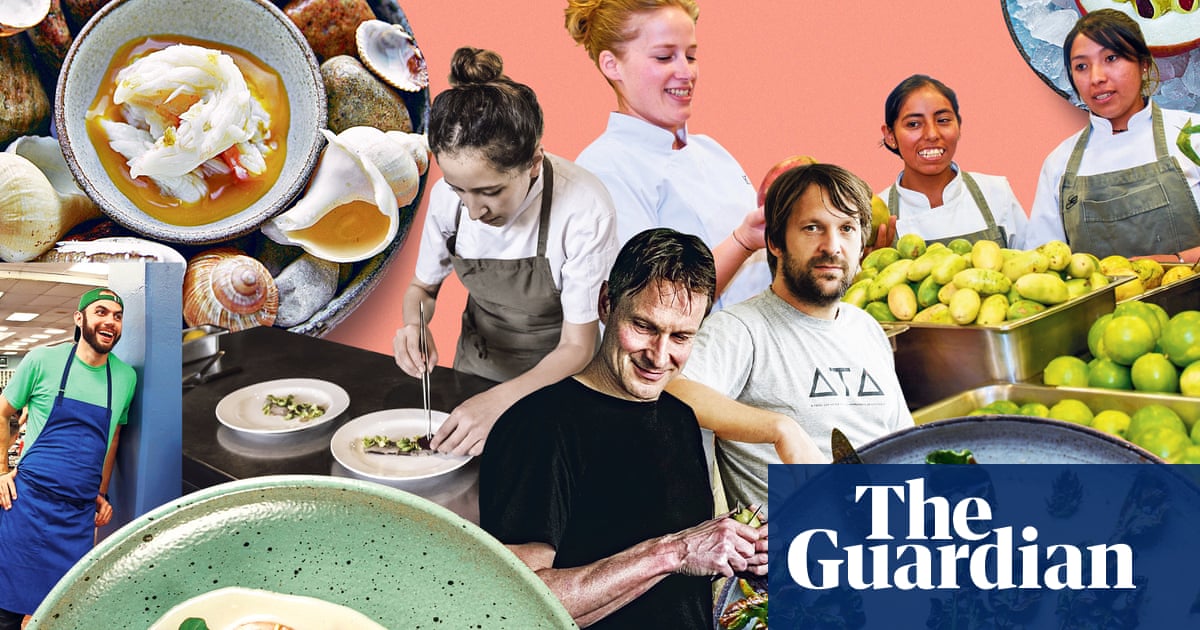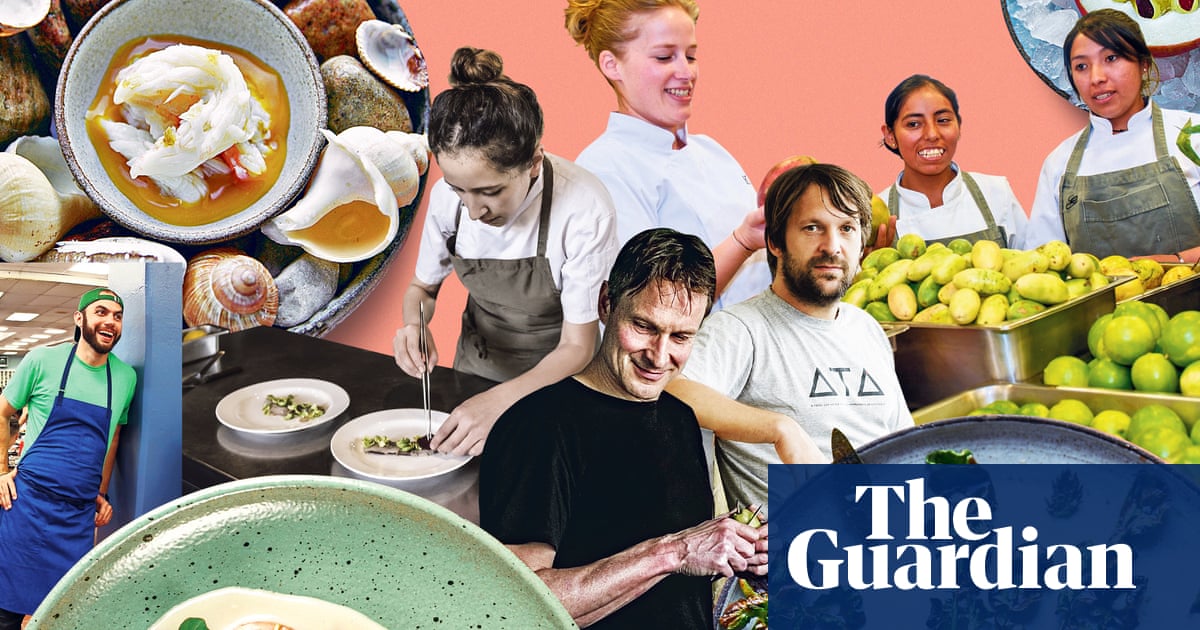The long read: In our time of climate crisis and inequality, as top chefs dream less of Michelin stars and more of changing the world, the New Nordic movement is reaching beyond haute cuisine into classrooms, supermarkets and parliaments

Few restaurants have enjoyed as much acclaim and influence, or been as widely caricatured, as the Copenhagen fine-dining institution Noma. In its 16 years of existence, it has been at the top of the Worlds 50 Best Restaurants list four times. There are three Noma books, two feature-length films and a Noma documentary series. There are Noma dissertations and dozens of Nomaheads dedicated diners who follow the restaurant all over the world, from Yucatan to Tokyo to Sydney and back again. In the early 2010s, there were so many articles about hunting for wild produce with Nomas charismatic head chef that one writer declared it The Era of the I Foraged With Ren Redzepi Piece. There is even a 240-page travelogue, written by an Esquire editor who followed Redzepi across the world for four years.
But all the attention that has been lavished on Nomas hyperlocal, micro-seasonal food butterflies moulded from blackcurrant leather; 100-year-old mahogany clams served in their shell has obscured the much more ambitious aims that the restaurants creators, alumni and allies have been trying to achieve. Noma as a traditional haute cuisine restaurant, with its elegant cookbooks and high-concept food, is being overtaken by a grander project. The people behind the restaurant are trying to expand New Nordic, a culinary movement they began in Scandinavia 15 years ago, to the rest of the globe. In doing so, they want to transform every link in the long chain of how food is produced and consumed, from the dirt up to your dinner table.
The New Nordic movement is bound by a set of 10 principles that stress sustainability, locality and respect for the natural world. Those ideals may sound familiar, but the scale of what its adherents are accomplishing makes New Nordic potentially far more transformative than any previous food movement. It is reaching beyond farms and fine-dining restaurants, and into halls of power, supermarket aisles, canteens and classrooms.
Pretty much anywhere in Denmark, you can walk into a supermarket and find ready meals made with traceable organic produce by co-operative kitchens in Copenhagen that bear the name of Claus Meyer, Nomas co-founder. Meyer has also created a food training programme in Denmarks prisons to reduce recidivism, and he is partnering with Ikea which feeds 660 million people a year, making it one of the 10 largest food-service operations in the world to veganise its menu.
Further afield, in Bolivia, Meyer has opened restaurants and cooking schools to revive the nations hospitality industry. In the US, Dan Giusti, a former head chef at Noma, now feeds more than 4,000 school children a day with nourishing meals, while in Albania, Fejsal Demiraj, one of Nomas current sous chefs, runs a foundation that researches and catalogues the nations village recipes to give the country a documented culinary history for the first time.
Followers of the New Nordic approach are also working to change food policy and production practices around the world. Building on the success of Noma and the New Nordic manifesto, Nordic governments have set up an institute to promote their regions food policies to other nations. In addition, Redzepi has set up a non-profit organisation called Mad it means food in Danish that led a campaign in partnership with the UN in the summer of 2019 against the environmental damage of food production.
There are also plans for a Mad Academy, with funding from the Danish government, which aims to become a Bauhaus of food, as its executive director, Melina Shannon-DiPietro puts it a place where all the different steps in food production are taught, and where efforts are geared towards answering the most urgent questions of the day: How do we make food sustainable? How do we make food available to all? How do we protect food cultures against globalisation?
Its as if Fergus Henderson took his nose-to-tail philosophy into Whitehall, got funding from the National Lottery and ended up getting people across the British isles to butcher their own meat, instead of just feeding offal to well-heeled Londoners. What the New Nordic movement is trying to export is not a single cuisine, but an all-encompassing philosophy of food.
Chefs were once courtiers; then, in the 19th century, they became artisans. For a time following the deprivations of the second world war, they were relics vestiges of lost luxury in a time of hardship and scarcity. As the age of reality television and fast money dawned in the 80s, so too did the bonafide celebrity chef: a hard-living, tortured genius who justified their wealth and fame with a relentless dedication to perfection. Then, around the turn of the millennium, came an era of techno-utopianism and the transformation of the chef into a wizard of molecular gastronomy, with its frozen foams and fluid gels and trompe loeil flourishes.
The New Nordic movement heralded another shift in the world of fine dining. In our current era of climate emergency and brutal inequality, celebrity chefs have transformed again, from ruthless kitchen dictators such as Gordon Ramsay and Marco Pierre White, or mad scientists such as Ferran Adri, into crusaders for a better world. Where once the dream was to cook for presidents, now the aim is to work with them. Massimo Bottura, the ebullient owner of the three-Michelin-star Osteria Francescana in Modena, was celebrated in the 2019 Time 100 for his work feeding the homeless. Jos Andrs, the Spanish chef once credited with bringing tapas to the US, now has an accolade far exceeding a Michelin star: a nomination for the Nobel peace prize, for his disaster relief efforts in Puerto Rico after Hurricane Maria. The pursuit of Michelin stars and coffee-table cookbooks has been superseded by pursuing a role in public life.
Of course, there have been powerful voices challenging the mainstream food industry before. At the height of the first-wave of the environmental movement, in the 70s, Alice Waters groundbreaking restaurant Chez Panisse, in Berkeley, California, shone a light on the relationship between food producers and cooks, encouraging diners to reject commercialism and supermarkets, and return to the farmers and ranchers who produce their food in a more sustainable way even if it means paying more for that produce.
Even Jamie Oliver, whose TV persona has been a figure of ridicule to many for the past two decades, invested much of his time in social enterprises, most famously challenging the British government on the quality of school dinners during the heady high-point of the Blair hegemony, and founding the not-for-profit restaurant chain Fifteen, which trained, and was staffed by, apprentices from disadvantaged backgrounds.

But the New Nordic movement has done more than any single chef to make doing more than just cooking the new normal. Redzepi could have opened up a Noma Dubai, and a Noma in the Vegas Bellagio. Thats what the old French masters, such as Alain Ducasse, Pierre Gagnaire and Jol Robuchon, did when they reached the peak of the profession: snatch up Michelin stars all over the globe for their luxurious outposts in far-flung, glitzy hotels. Instead, Redzepi is devoting his time to Mad and to a revamped Noma often referred to as Noma 2.0 just a couple of kilometres from the site of the now-shuttered original.
Still, the movement and the restaurant at its forefront has its critics, who argue that it can be sanctimonious, or narrow, or inattentive to the simple notion that food should be a pleasurable experience. George Reynolds, writing for Eater, took Noma to task for its self-imposed Nordic exceptionalism, writing that its borderline isolationist culinary philosophy doesnt feel quite right for the present age; more than ever, closing yourself off to other influences is not just unnecessarily limiting but politically unpalatable.
The fact is, though, that the rise of New Nordic means there is no longer a bright line between the chef and the activist, the test kitchen and the laboratory. Joe Warwick, the creative director of the World Restaurant Awards, believes that the people leading the New Nordic movements restaurants, canteens, labs, thinktanks, policy institutes and cooking schools, have exerted influence on their industry on a scale that only a few chefs and restaurants in history ever achieve.
Two decades ago, Denmark might have seemed a rather unconducive place for a revolution in haute cuisine, let alone in food altogether. Being generous, you could have said that it was a country of open-faced sandwiches, hot dogs and overproof alcohol. But you might also have associated it with the cheapest processed pork in the EU, known for being made in a grim factory from a candy-pink slurry of something that once was a pig. Back then, all you could get in the centre of Copenhagen was bad French food or bad Italian food, the food writer Andrea Petrini told me. There was no Danish food culture.
One of the New Nordic movements first feats was to help to transform Scandinavia from a land of herring cured in lye to the gastronomic centre of the world. In 2000, Claus Meyer, then a TV chef and one of Denmarks most recognisable faces, had been appointed by the Social Democratic government to overhaul the countrys poor culinary reputation. He led a committee to create a special quality label for the best Danish food producers to apply for, in the manner of Frances Label Rouge system, which certifies the quality of foods such as Bresse chicken and Bayonne ham. But at the next election, in 2001, the Social Democrats fell, the initiative was scrapped and Meyer was dismissed. I realised when the committee was demolished that working towards a better food culture was not wanted in parliament anymore, Meyer told me. I found that so crazy.
So Meyer bankrolled a proof-of-concept restaurant in Copenhagen that would champion Nordic produce. In 2003, Meyer opened Noma the name is a portmanteau of nordisk mad (Nordic food) with Redzepi, then a rising star with no experience as head chef, at the helm. Around the same time, Meyer corralled 13 of the Nordic regions best chefs into an 18-hour workshop to carve out what a world-leading food culture would look like. Meyer and the chefs agonised over the precise wording, order and emphasis of what would become the Manifesto for the New Nordic Kitchen, published in 2004 a 10-point mission statement that sought to express the purity, freshness, simplicity and ethics we wish to associate to our region.
Noma, which had spent its first year tweaking French classics with Nordic herbs, moved with religious fervour towards locavorism, making everything as wild and Scandinavian as possible. We put the forest, or the shore, or the snow on a plate in front of you, Redzepis dishes often seemed to say. The hope was that Scandinavias restaurants would realise the potential of the region and set about regenerating a Nordic food culture.
What took New Nordic from a local concern to a global movement, however, was Nomas astonishing success. When Noma dethroned the Spanish restaurant El Bulli, a temple of molecular gastronomy, at the top of the 50 Best list in 2010, it represented a transition between two self-defined eras of haute cuisine from the laboratory to the forest cabin, so to speak. El Bulli would close for good a year later, with its head chef, Ferran Adri, recognising the end of his restaurants journey.
El Bulli had always sought to push the limits of what a restaurant could be, bringing in scientific rigour and dedicated lab spaces to make its food more daring. Redzepi had been a student of Adris at the height of El Bullis fame. Nomas innovation was borrowing Adris approach and applying it to answer the questions posed by the New Nordic manifesto: how to radically enlarge the scope of what we think of as food, while making it more ethical and accessible.
Noma began attracting talents from outside the food world: anthropologists, molecular chemists and agricultural scientists who would work in its Nordic Food Lab. This lab space which was, for many years, a rigged-up houseboat moored outside of the restaurant developed new local products, such as miso made with Danish yellow peas, or salt from shoreline seaweeds for the restaurant to use, while doing original research into the culinary biodiversity of Scandinavia.
Lars Williams, who was drafted to Noma from Heston Blumenthals test kitchen in 2009, moved to the houseboat in 2010 to run the Nordic Food Lab for two years. Wed be as scientific as chefs could be, Williams said. Wed try the same idea 30 different times, with 30 different incremental variations, and record it all to assure wed been rigorous. Much like the restaurant, the lab operated with solely Nordic produce, but did its best to stretch that definition: Things from the Faroe Islands were fair game, things from Northern Norway were fair game we didnt just operate around a kilometres radius around Copenhagen.
A lot of what the lab worked with land wheat flour, ggeblomme (egg yolk) potatoes and other native varietals had never been tested and examined to such depth before. Through the labs research, crops that had all but ceased to be cultivated were finding new uses, and a reason to be grown again.
At the peak of Nomas powers, when it felt as if every other food article was about the majesty of New Nordic, Redzepi began to look beyond the restaurant kitchen. In 2011, he launched what would become a series of annual ideas conferences, the Mad Symposiums, where invited speakers everyone from the head of the European Environmental Agency to Japans most celebrated soba noodle maker would address an audience of superchefs, interns, farmers, journalists and industry figures on a patch of Copenhagen dockland.
These gatherings, which straddled the line between networking events, university lectures and evangelical tent rallies, helped build the movement that is spreading across the globe today. Figures of all stripes and skills would swap business cards, applaud each others speeches, plan events and collaborations together, united in the belief that everyone had the destiny of the food world in their hands.
In 2012, Redzepi launched the Mad non-profit, to unite a global cooking community with a social conscience. Aside from its larger symposiums, Mad has run pop-up salons in London, New York and Sydney, inviting local chefs and journalists to talk about topics as expansive as abandoning ego, indigenous food culture and questioning the very value of life itself. They have partnered with Yale to teach students about leadership, have published essay collections on how food cultures overlap all over the world, and launched a foraging app, VILD MAD (wild food), to help users find whats edible in their local park.
Around the same time that Redzepi founded Mad, Meyer, who sold his majority stake in Noma in 2013, began testing New Nordic principles far beyond Scandinavia. After mapping the countries of the world on metrics such as economic development, crime rates and biodiversity, Meyer decided to open a restaurant called Gustu in Bolivias capital, La Paz, with another talented young Danish chef, Kamilla Seidler, at the helm. Seidler and her team used Bolivias fauna and flora to create the restaurants idiosyncratic cuisine llama tartare, alligator escabeche and a lot of quinoa and brought the restaurant on to the foodie radar. But more importantly, she completed the restaurants primary objective: training the restaurants Bolivian staff so she could leave Gustu in their hands.
To do this, Gustu opened two Manqa cooking schools, named after the indigenous Aymaran word for food one based in the capital, La Paz, and one in Bolivias second city, El Alto. Manqa offered general culinary qualifications that enabled all students to work in the hospitality industry; exceptional students, such as Gustus current head chef, Marsia Taha, would be placed on a fast-track scheme to move into the world of fine dining. There are now nine Manqa schools in Bolivia and two in Colombia, more than 1,000 alumni, three canteens for La Paz locals to eat a freshly cooked three-course meal for just over 1.50, a tour company, a catering service and a fleet of delivery drivers to order a takeaway from.
Alongside this, there is now a manifesto for a new Bolivian cuisine, drawn up by Meyer, Manqa alumni and local figures within the Bolivian food scene; there is a Gustu bar selling Bolivias national spirit, singani, and a whole host of restaurants across Bolivia, helmed by ex-Gustu staff, continuing to reimagine Bolivian food and make use of farmers and suppliers providing indigenous produce. In 2014, President Evo Morales had the restaurant cater his third-term inauguration. The following year, the restaurant was asked to devise a recipe for special quinoa communion wafers presented to Pope Francis when he visited the country.

Seidler, after Gustu, returned to Copenhagen to carry through her vision of what she calls social gastronomy with her latest restaurant, Lola, which operates as both a fine dining restaurant, and a job inclusion programme that trains socially excluded individuals in cooking and hospitality skills.
Others, such as Nomas New Jersey-born former head chef Dan Giusti, have turned their efforts toward improving the food of public institutions. In 2016, Giusti opened Brigaid, a chef-led startup that brings chefs into public schools to train cafeteria staff, ensuring that pupils eat made-from-scratch food every day beef tacos and chicken teriyaki instead of vending machine snacks or, worse still, nothing. Brigaid has now expanded into three states, feeding thousands of school children every day across 12 public schools. Its a world away from the 40 covers a night he served at Noma.
The volume of social initiatives pushed by Noma affiliates is staggering. Another former head chef, Matt Orlando, runs a scheme that teaches Copenhagen schoolchildren how to grow their own food in small urban spaces. Over the road from him in the docklands of Refshaleen is Empirical Spirits, a distillery run by Noma alumni that has organised agronomy workshops in the Oaxacan mountain village of Huitepec in Mexico to help the community continue growing its most valuable crop, the Pasilla Mixe chilli.
Roberto Flore, former head of the Nordic Food Lab, now runs a lab at the Technical University of Denmark that offers space to experiment and develop schemes addressing matters such as hunger, food waste and accessible technology for food production. One scheme, called ServedOnSalt, has developed a battery that uses solar energy, salt and water to create a cheap and clean-powered cooking stove for use in refugee camps; another has been focused on improving the safety and storability of milk products across rural Ethiopia.
Scandinavia now leads the world in food policy, too. In 2018, Dr Afton Halloran, one of the worlds foremost experts on sustainable food systems, published a collection of innovative food policies from around the Nordic region, the Solutions Menu. It outlined the benefits of 24 innovative food policies, aggregated from successful initiatives around the Nordic region including universal free school meals, organic food in hospitals and schemes to help farms move towards zero food waste. Halloran and her co-authors cited Noma and the New Nordic movement as their chief inspiration.
When the Manifesto for the New Nordic Kitchen was first published, in 2004, the reaction in the world of fine dining was sceptical, if not outright suspicious. The manifestos points were criticised for being too vague, too piecemeal, too male all the signatories were men and too focused on encouraging cooperation rather than challenging the regions industrial food producers through legislation and policy.
At the time, Camilla Plum, a Danish food writer and TV personality, was quoted in Denmarks newspaper of record, Berlingske, lambasting the manifestos toothlessness. The manifesto reminds me a little of Queen Margarets annual New Years speech, Plum said. There are lots of good-natured thoughts and the usual nice greetings to Greenland. They are beautiful sentiments, but they have no real meaning.
Today, though, it seems indisputable that the manifesto more than succeeded in its aims. Scandinavia now stands alongside Spain, France and Italy as one of Europes major gastro destinations, with Michelin stars being found as far north as Trondheim in Norway, 200 miles south of the arctic circle. Thousands of jobs in hospitality have been created and, with them, catering colleges full of new students. There are new food producers and artisans, and more diners engaged with the food of the region in which they live.
That said, the desire to shake up Scandinavias culinary reputation seems a little bit provincial now. The movement has long since mutated into a much larger phenomenon. The aim was once for the Nordic kitchen to be seen as natural and sustainable; now, anything with bare wood, organic produce and a compost bin can be thought of as Nordic.
Beyond that, the movement has established a Nordic way of doing things that can be adapted anywhere in the world, to breathe new life into cuisines that are distinctly Bolivian, or Mexican or Albanian. And these are just the first initiatives that Noma and the New Nordic principles have sparked. Weve already seen people who have come from Noma step out into the industry and work towards change, says Dan Giusti. But theres people in that kitchen right now, and more people who will come through there in future, who we havent heard yet. In 20 or 30 years, theres no telling how big the change could be.
Follow the Long Read on Twitter at @gdnlongread, and sign up to the long read weekly email here.


Recent Comments